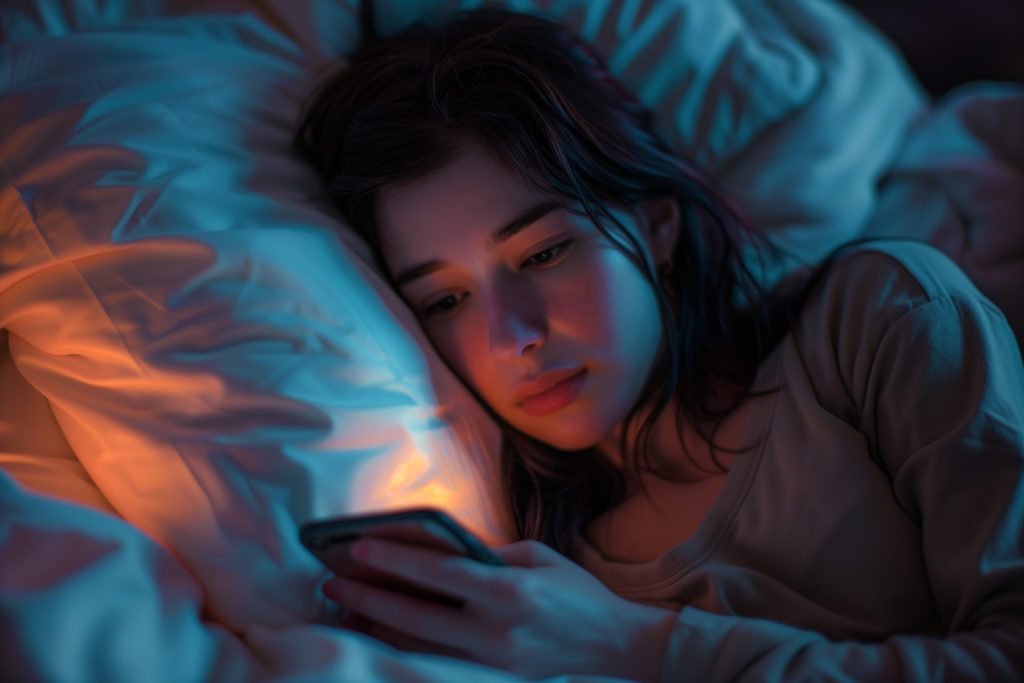
Can Reducing FOMO Improve Nighttime Sleep?
Read our article to learn why reducing FOMO can enhance your nighttime sleep. Learn insights from the latest research and say goodbye to sleepless nights!

Have you ever stayed up late scrolling social media and wishing that you’d gone out with your friends? If you have, chances are you’ve experienced FOMO or the Fear of Missing Out. This can plague us all, no matter the occasion. Some of us are worried about missing out on social events, while others may be worried about sleeping through a TV show that we’ve been trying to watch. Regardless, FOMO affects us all, including our sleep.
In this article, we’ll explore how reducing FOMO can actually help us improve our nighttime sleep. We’ll discuss how reducing this feeling will help with our anxiety, sleep hygiene, sleep environment, and relaxation. All in all, as you’ll come to find out if you can reduce that burning desire to be involved with all that is happening in your social circle, you can enjoy better rest.
How Reducing FOMO Improves Nighttime Sleep
With certain tactics to reduce the presence of FOMO in our lives, we can improve our nighttime sleep. FOMO can lead us to create some negative habits, including checking social media late at night, feeling more anxious, or even developing insomnia if we carry this habit with us in the long term. Let’s explore five common ways that reducing this issue can enhance our rest, starting with the first and one you may have guessed: a reduction in your anxiety.
1. Reduces Your Anxiety
One of the first ways that reducing your Fear of Missing Out impacts your sleep is by lessening your anxiety. Since FOMO is “the fears, worries, and anxiety” you may feel because you’re not involved in an activity or event, reducing your FOMO by limiting your time online before bed can actually lead to less anxiety before you go to sleep.
You won’t experience racing heart rates, but instead, you’ll likely experience a clearer mind and fewer worries about what’s happening on the internet or in real life. Ultimately, once you realize that your notifications will be there when you wake up in the morning, you’ll create better habits and curb some of the actions that bring you more anxiety, which can allow you to fall asleep much faster and without as much difficulty.
2. Improves Your Sleep Hygiene
Many people who experience FOMO also happen to have difficulty with sleep hygiene. If you manage to limit your FOMO, you’ll be able to improve your sleep hygiene and curate a more regular schedule for your rest. One study during the pandemic showed that people’s FOMO actually contributes to sleepiness during the day and heavy smartphone use during the evening hours, leading up until late at night.
If you limit the amount of FOMO you experience, you’ll be able to experience more energetic days. Even more so than that, your sleep hygiene will improve because you’ll be taking steps like shutting off your phone by a certain time or even leaving it in the other room. Without FOMO, you can ensure you’re getting the right amount of sleep, and your sleep and wake cycles are not disturbed, leading to better nighttime rest.
3. Enhances Your Sleep Environment
Studies have shown that reducing FOMO and its primary cause—using smartphones and social media platforms before bed—contributes to a better sleep environment. Digital detoxing was common during the pandemic, and one study has proven that it not only limited people’s Fear of Missing Out but also helped ensure people experienced better sleep settings (Source: PubMed).
Limiting your FOMO, especially if it is tied to social media or smartphone use, can be very beneficial to your overall health and the environment you curate for sleep. If you don’t use your phone nearly as much, you will not be exposed to light and other disruptions that may hinder your sleep, giving you a more relaxed setting to finally catch some shuteye.
4. Increases Your Relaxation
As you may have guessed, experiencing less FOMO will make you feel more relaxed before bed. You won’t feel those annoying pangs of anxiety, nor will you feel the urge to keep checking on social media. In fact, you’re much more likely to be ready for sleep, especially due to the studied associations between smartphone use, FOMO, and stress.
A study from the Frontiers in Psychiatry journal showed that insomnia was mediated somewhat by interpersonal stress and FOMO. Additionally, this affects people’s mental health and their stress levels. In other words, people’s smartphone use and their FOMO could be part of why they are so stressed. If you limit your FOMO, you’re more likely to feel less stressed, leading to more relaxation as you lay down to go to sleep.
5. Encourages Better Sleep Quality
Combining the benefits of reduced anxiety, more relaxation, and improved sleep hygiene and sleep environment, it’s easy to see why less FOMO in your life will produce better sleep quality. Several studies have proven this and shown that those who are able to curb the habits of consistently checking social media will experience better sleep quality over time (Source: National Library of Medicine).
If you are a parent and have a teen you feel might suffer from FOMO, limiting smartphone use has been proven to encourage long-term sleep quality improvements, too. In the end, the more that you’re able to manage—even eliminate—your FOMO, the more rested you’ll feel and the more energy you’ll have throughout the day.
How Will You Reduce Your FOMO?
FOMO can be difficult to overcome, but you don’t have to suffer from poor sleep. As shown in the studies we discussed, reducing your FOMO can help you with so much: reduced anxiety, better sleep hygiene and sleep environments, and even more restful mornings. With the tips we have provided, you see just how important limiting FOMO can be in our lives. How will you limit your FOMO to encourage better sleep?

Written by
Marie Soukup
Marie Soukup is a seasoned copywriter, editor, and Integrative Nutrition Health Coach with a certificate from the Institute of Integrative Nutrition (IIN). With years of experience working with brands across diverse industries, Marie is passionate about holistic health and crafting compelling content.
Download Pillow
Get help
Press & News
Legal
Connect
X (Twitter)
Company
Copyright © Neybox Digital Ltd.



